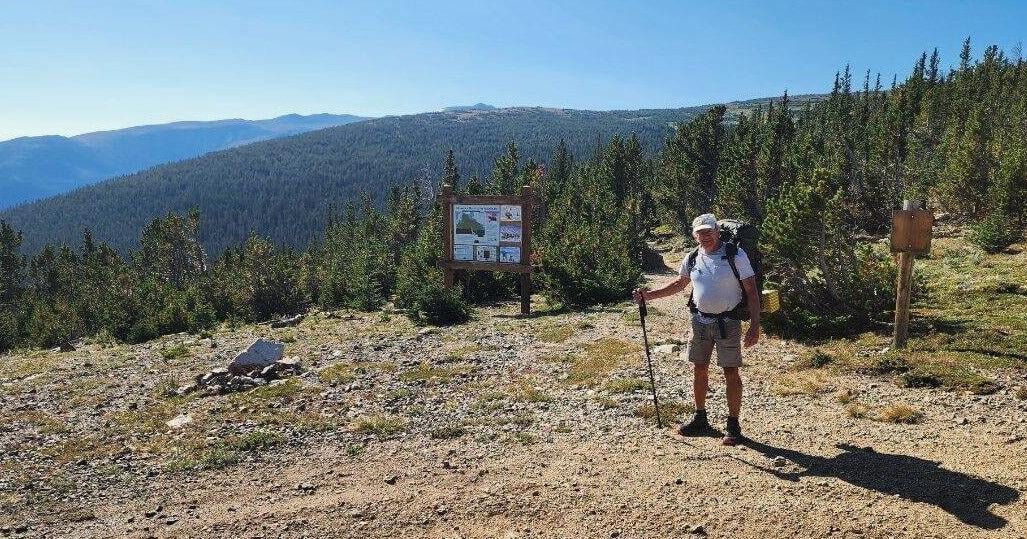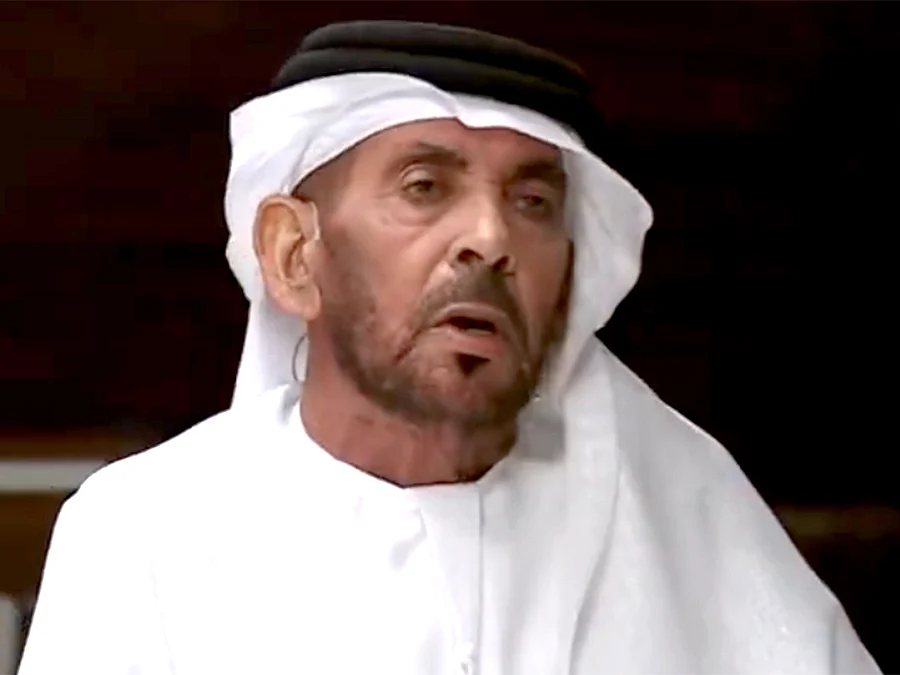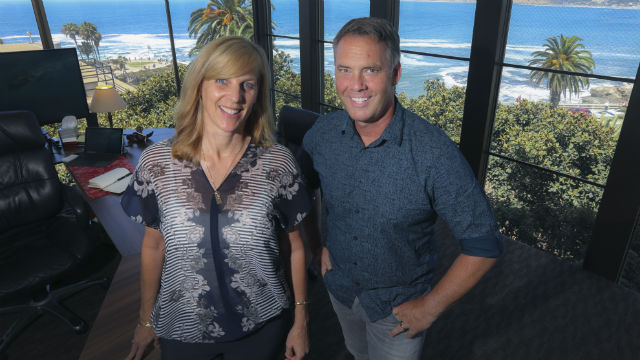
Missing for five days in the rocky, high plateau country of the Absaroka-Beartooth Wilderness this past August, retired Billings construction worker Cris Hernandez defied the odds.
“Regardless of age, health, knowledge in the outdoors, you know — regardless of everything — the longer somebody’s out there, their survivability does drop,” said Ty Williams, Stillwater County Sheriff’s Office chief deputy and commander of the county’s search and rescue.
Williams coordinated the search for Hernandez, a multi-agency response.
“It had been over three days,” Hernandez noted of how long he was missing before the search was even launched. “Odds were that things did not look good for me.”
Search vs. recovery
Those slim odds were accentuated when the Billings National Guard helicopter was pulled after the first day of searching. A Guard official decided that Hernandez had been missing so long that the mission was no longer a search but instead a recovery effort. Legally, the Guard is prohibited from participating in recoveries.
There were several reasons the Guard may have jumped to that conclusion, Williams said. One was that despite having a cellphone, Hernandez never sent a 911 call for help. To Williams, that indicated the missing 75-year-old backpacker may have been injured or debilitated.
The Beartooth Mountains in south-central Montana are also steep and rocky terrain, Williams noted, containing the state’s highest peak and most of Montana’s highest mountains.
“They’re very rugged, very easy to get lost in, very easy for things to go bad in,” he added. “The whole (Stillwater) plateau is over 10,000 feet. So anytime you’re around or above 10,000 feet that is, in itself, a huge challenge.”
Hernandez had also visited the area several times before, so he was familiar with the terrain and was supposed to know where he was going. Lastly was his age.
“All of that kind of led to some concerns from the get-go, whether his survivability was there or not,” Williams said.
‘Old granola’
A self-described “old granola,” Hernandez has been backpacking since 1976, a time when heavy, external frame packs and gear were the norm. As a student at Montana State University-Billings he would spend weekends exploring the state’s wild lands, from the Bob Marshall and Scapegoat wilderness areas in northwestern Montana to the nearby Beartooth Mountains.
While working in the small community of West Yellowstone in the 1980s, he was an avid cross-country skier and snowshoer, even introducing the sports as part of the local grade school’s gym program, he recalled. And he’s always been a runner, taking part in this summer’s 18-mile Bighorn Trail Run in Wyoming which gains more than 3,600 feet in elevation.
This is a man comfortable in the outdoors, but also stubborn about his old-school ways. He doesn’t carry a GPS or emergency locator beacon, preferring to rely on a map and compass. He avoids water purification pumps or filters, instead taking his chances drinking from what appear to be clear mountain streams.
He also, like many aging males, was slow to acknowledge his physical abilities had faded. Nature, in this case, became a tough teacher.
Day 1 – Thursday, Aug. 21
Hernandez and his younger friend, 46-year-old Austin Richland, shouldered their packs at about 10 a.m. on Aug. 21 for what was supposed to be a four-day trip to Lake Wilderness. To conserve battery power, Hernandez put his cellphone on airplane mode.
Even the trailhead isn’t easy to reach. A winding, rock-strewn dirt road climbs from outside the community of Dean to the historic Benbow chrome mining area, still littered with old cabins and tailings.
The lake is reached by hiking 7 miles across the 10,000-foot-high Stillwater Plateau.
The first part of the hike crosses a grassy area nicknamed the Golf Course because of its flat, vegetated expanse. A trail marks this grassy route for 2 miles before hitting an endless ridge of huge rocks marked with an occasional pile of rocks, called a cairn, to indicate the route.
“It’s definitely not an easy hike,” Richland said, especially with the 45- to 50-pound backpack he was carrying. “You don’t have an established trail.”
Broken by boulders
As hikers advance south along this ridge, Hernandez said, there are three humps that must be scaled while gaining 1,500 feet in elevation before dropping down to Lake Wilderness. The descent to the lake is a 1,100-foot off-trail plunge while bushwhacking through dense pine trees. The lake rests at an elevation of 9,581 feet.
The lake’s outlet drains into Woodbine Creek, eventually reaching the valley floor about 4,000 feet below at popular Woodbine Falls along the Stillwater River.
After scaling the first two humps, Hernandez said he ran out of energy.
“There was a point there where I realized that climbing was not in the picture anymore,” he recalled.
Unfortunately, not wanting to slow down his younger hiking partner, Hernandez had encouraged Richland to continue ahead. By the time the third hump appeared, however, Hernandez came to the realization that he was physically exhausted and running out of daylight.
“I looked at it, sh–. I can’t, I can’t do it,” he said.
Hernandez decided to camp atop the plateau for the night, enjoying the closer view of the star-filled night sky.
“God I love being in the mountains,” he wrote. “I hope Austin isn’t too worried and enjoying the lake.”
Meanwhile, Richland — who was equipped with a GPS, map and phone mapping app — waited atop the plateau at about 10,600 feet until about 7 p.m. before deciding to descend toward the lake. He only made it partway before it started getting dark. Finding a reasonably flat space, he pitched his tent and dropped into an exhausted sleep, a tree keeping him from sliding off the steep mountainside.
Day 2 – Friday, Aug. 22
After waking on Friday morning, Hernandez realized the extra compass he thought he had packed was nowhere to be found. His main compass and map of the area had been given to another friend who was going to join them on Friday.
“I was walking blind,” he said.
Realizing he couldn’t continue climbing, Hernandez decided to sidehill off the plateau in hopes of intersecting the lake as he moved south. After reaching a creek that he thought was the lake’s outlet, he began following it upstream.
It was the wrong drainage.
The creek bottom was thickly forested and cluttered with downfall. Along the route were sections of tundra, marshy areas and more boulder fields, making travel slow and difficult. In a six-page typed recollection of his trip, Hernandez called it “ugly and beautiful at the same time.”
“I feel comfortable doing that,” he said. “I knew that I flubbed up. I knew that I missed the lake.”
After getting tired of skirting one marsh, he boldly trekked across another getting wet to his waist. After finding a flat spot, Hernandez decided to camp another night, spreading his wet clothes out on branches to dry.
The same day, Richland awoke and picked his way through the trees down to Lake Wilderness, another two-hour hike. Unsure where the campsite was, he dropped his pack and scouted the area, finally finding the fire ring. Hoping that Hernandez would eventually show up, he stayed at camp.
“I sat at the camp for a while thinking through what’s going to be the best thing to do?” Richland recalled. “Why didn’t he get there? Figuring out, well, if I am going to go back up, and I’m not positive how he came in, what’s going to be the best thing to do? I knew at that point I was at least going to stay there for the night, just to give him as much time as I can.
“I figured he either went back to the truck because he didn’t have enough water, and it was a tough hike, or he just got hung up there.”
Day 3 – Saturday, Aug. 23
The morning of the third day Hernandez awoke to find the clothes he had set out to dry frozen stiff by the overnight cold. Heavy dew had soaked his sleeping bag and pack.
After building a fire to dry out, he set out again, not bothering to eat.
“I should have stopped at this point,” he wrote. “Hell, I should have never left the plateau.
Yet he added, “There is a certain joy of walking through terrain that no human visits.”
It was time to accept that he was lost. To get his bearings he slowly climbed to a high point where he could see the plateau far overhead.
Too weak and disheartened to continue hiking, he made himself comfortable. Hernandez doesn’t carry a tent for shelter, instead relying on a much lighter tarp which, to this point, he hadn’t bothered to set up.
“Knowing that everybody else was really worried” was what bothered him the most. “That was more stressful to me, because I knew I was OK, but I knew other people were worried.”
He settled in to wait in hopes searchers could find him.
“I was fine. Really weak from eating just once a day,” he said. “When you go into survival mode you assess everything. How much food? Where are you? You know, how difficult is it to get out of here? Blah, blah, blah, you know, you assess everything, right? How much doo-doo paper do you have? “
Hiking partners meet
By Saturday, Hernandez’s friend Aaron Redland was hiking in to Lake Wilderness as Richland — worried that his friend had never shown up — began climbing out. The two backpackers met along the plateau, about 3 miles from the lake.
Richland was hoping that Redland had run into Hernandez at the truck, but that wasn’t the case.
“So that’s when I really, really started getting worried because he wasn’t at the truck, and she saw no signs of him,” Richland said.
Together they walked back along the plateau looking for signs of Hernandez, whistling and calling out to him.
Around 5 p.m., Richland phoned the Stillwater County Search and Rescue to convey that Hernandez was officially missing. Cellphone service, he discovered, had been available because of the plateau’s altitude. It was too late to launch a search team, given the distance to the plateau, so Williams readied a group of four for a 4:30 a.m. departure on Sunday morning to begin a ground search.
“The vast majority of search and rescue missions that we’ve had, whether it’s rescues or injuries or searches, we’ve been able to use technology to really narrow down where somebody is at or get pretty close to them,” Williams said.
But pinging Hernandez’s cellphone hit on the road going up to the plateau, probably the last time he had a signal.
For Williams and his search team, that meant it was “almost like going back in time and having to do things the old school way” by starting from Hernandez’s last known location. Hikers tend to deviate only a certain amount when they get lost. High points can be an attraction, as the lost person seeks a place to get cell service or to get their bearings.
“Generally speaking, you kind of come up with three possibilities or theories of what happened to this person, and those are, to an extent, what kind of drives the search until you start finding evidence that either supports one of those theories, or forces you to create a new theory,” Williams explained.
Pressure was heightened on the team because Hernandez had already been missing three days. Atop the mountain, Richland drove Redland back to her car and returned to the trailhead to spend the night.
Day 4 – Sunday, Aug. 24
In addition to Stillwater County Search and Rescue members fanned out across the plateau, Williams was also able to secure the help of a Billings-based National Guard and private helicopter to grid search the area.
Listen now and subscribe: Apple Podcasts | Google Podcasts | Spotify | RSS Feed | Montana Untamed
Meanwhile, Richland got permission to hike back to where he had last seen Hernandez, scouring the area for clues.
“I was just super scared, hoping to God that search and rescue would find him,” he said.
Hernandez finally took his phone off airplane mode and attempted to send an SOS signal or 911 location to no avail.
Day 5 – Monday, Aug. 25
By Monday, a mutual aid call by Williams to surrounding counties brought the ground team up to 17 people, including two dog teams. Due to the distance and difficulty of the terrain, much of the ground search was limited to the north half of the plateau because searchers had to turn around or risk running out of daylight. Yet in two days they covered about 230 miles, Williams said.
As search efforts kicked into high gear, Hernandez brewed his first cup of coffee in five days.
“The waiting game begins in earnest,” he wrote.
Seeing one of the helicopter crews flying along the plateau, Hernandez lit a signal fire atop a large flat rock in hopes they might see the smoke produced when he piled green boughs onto the blaze. Unfortunately, the wind came up and the smoke disappeared.
“That makes me laugh and cuss a little,” he wrote.
The Air Force’s newest helicopter, an MH-139A Grey Wolf, arrived with a five-person crew in the early evening.
“They were really doing an extensive search around Lake Wilderness to the south of the plateau and were planning to do an extensive search of the west side of the plateau,” Williams recalled. “All of that is a pretty thick, treed area.”
Still waiting at the trailhead, Richland cooked a dinner of ramen on the tailgate of his truck. Sitting down inside the pickup with the door open, he heard footsteps and turned to see a black bear only 10 feet away, walking toward the truck. Richland hurriedly closed the door, which scared the bear into scampering away.
“All the times that I have been backpacking I never ran into a bear on the trail,” he said. “So that was actually my first bear encounter.”
The surprise meeting further emphasized the ruggedness and wildness of the area while heightening concerns among Hernandez’s family and friends.
Night flight
After flying during the waning hours of daylight and seeing nothing, the Air Force helicopter crew returned to Big Timber to refuel and prepare for a flight using night vision goggles and their forward-looking infrared cameras, or FLIR, hoping that they could see the thermal glow of a human in the dense trees.
“As they flew the crew discussed their strategy, noting the last known campsite’s location at 9,000 feet near glacier lakes,” according to an Air Force news release. “The crew and flight medic reasoned that a weakened hiker might follow the terrain in search of water. Adding his expertise of the area, Staff Sgt. (Chase) Rose suggested searching a specific creek valley.”
Just as the copter was turning back toward Lake Wilderness after flying up Woodbine Creek, co-pilot Capt. Jaani Barclay saw a flicker of light.
That night, Hernandez went to sleep with his flashlight handy in case a copter flew again. Waking to the sound of the chopper, he rose and began shining his flashlight while waving his phone’s flashlight in the direction of the searchers.
“They blink their lights at me,” Hernandez said. “And unbeknownst to me, they’re using night vision. The flashlight was blinding them.”
“Cris actively signaling them was a huge part in his rescue,” Williams said.
Even though the copter was 4.5 miles away, the crew was able to see Hernandez using its forward-looking infrared camera.
“We weren’t sure it was him, but this person needs help,” Capt. Jacques Soto said in the news release. “Even if it isn’t the lost hiker, it’s someone out here in the middle of nowhere who needs help.”
Hernandez was “signaling from a slope in a dead-end canyon, surrounded by 1,000-foot rock walls,” according to the Air Force. “The marshy site on the ground was unsuitable for landing.”
Gift from above
After flying overhead and then moving away, Hernandez thought maybe the crew hadn’t seen him. But according to the Air Force, the pilots were trying to find the best approach considering the tight canyon, surrounding trees and winds that complicated their attempt to land.
“The aircraft was descending at hundreds of feet per minute, and we couldn’t get it stabilized,” Soto said. “We took the option to fly away. Fly the escape.”
Then the copter returned to hover 70-feet overhead, prompting Hernandez to grab his sleeping bag and tent so they didn’t blow away in the rotor wash.
Like a gift from heaven, Maj. Collin Urbanowicz, from the 341st Operational Medical Readiness Squadron at Malmstrom, dropped from the sky using the helicopter’s hoist.
“Are you Cris?” the aeromedical physician assistant asked Hernandez when he reached the ground.
“Yes, of course I’m Cris,” Hernandez wrote. “Is there someone else crazy enough to be out here?”
“He was standing,” Urbanowicz recalled afterward. “You could tell he wasn’t injured or anything. Still mentally with us,” although the news release added Hernandez was disoriented and dehydrated.
Urbanowicz then communicated to his hovering crew that their night patrol had paid off. The airmen relayed the information to Williams and his team of searchers who then notified Hernandez’s anxious family.
“It was a little bit surprising, because, again, we did have concerns from the get-go that Cris may not survive this,” Williams said.
Airborne relief
Originally, the plan was to lower a litter to pluck Hernandez from the mountainside that night, but crosswinds were making it difficult to stabilize the helicopter. With its fuel running low, the crew opted to leave Urbanowicz behind.
“They had to peel off,” Urbanowicz said. “I’m down there with him and like, ‘Well, change of plans! We’re going to be here a bit longer.’”
Hernandez said he was instantly relieved once the rescuers reached him.
“Once I knew that the word had gotten out that I was found, then I was able to relax a little bit,” he said. “We both enjoyed the rest of the night.”
It was already past midnight when the helicopter crew flew back to Big Timber to refuel and discuss their options.
“A hoist extraction was deemed imprudent in the conditions and Urbanowicz was unreachable by hoist due to the deteriorating weather above the site,” the Air Force said.
Instead, the crew returned to drop additional supplies.
It wasn’t until about 3 a.m., while camped atop the plateau with Hernandez’s brother-in-law Pat Smith, that Richland received a call from his wife telling him his missing backpacking buddy had been found.
Describing himself as “extremely happy,” Richland had a difficult time going back to sleep and was anxious to get off the mountain so he could learn more details about what had occurred.
Day 6 – Tuesday, Aug. 26
At 10:30 on Tuesday morning, a UH-60 helicopter from the National Guard’s Helena base arrived to hoist Hernandez and Urbanowicz into the ship and fly to the Columbus airport. From there, Hernandez was taken by ambulance to the nearby clinic to be rehydrated with intravenous fluids and checked over. His son now jokingly calls the unfortunate adventure his “nature retreat.”
“It was pretty amazing to see somebody go through that and stay that composed,” Richland said of Hernandez’s son.
More than a week after his rescue, when Hernandez agreed to meet at a Billings restaurant for an interview, he still hadn’t fully regained his strength. His doctor had advised slowly reintroducing food, but by then eggs, a ham steak, potatoes and toast were on the breakfast menu.
Despite the concern his days missing had generated among his family, friends and rescuers, Hernandez still vowed to return to the mountains in the future. Next time, however, he’ll have a satellite communication device, something he purchased not long after his National Guard helicopter ride.
Had Hernandez possessed the device before his outing, Williams said it would have been easy to locate him.
“So use the technology that’s available, absolutely, at all times,” Williams advised all outdoors recreationists.
He also suggested people always stick together.
“Don’t separate when you’re hiking with somebody.”
That’s something that still haunts Richland.
“There’s a lot of guilt on my end for not being with him,” he said. “I absolutely regret not staying within eye shot of him and hiking together the entire way.”
Despite the complications of the Lake Wilderness trip, Richland said he would happily go backpacking with Hernandez again, although qualifying that his friend must bring a map of some kind next time.
Although Hernandez wandered far off the route to the lake, Williams praised his level-headedness.
“The thing that Cris did really, really well and was crucial in his rescue was he stayed put and he did not panic. And I think not panicking is one of the most overlooked but most critical things.”
Embarrassed about making his tale public, Hernandez said talking about the event was helping him process what happened, the main conclusion being that he can’t backpack in the mountains like he once did.
“I can’t do what I used to be able to do,” he said. “Which is kind of hard to swallow, man.”
Being honest with yourself about your capabilities is important for all outdoor recreationists, Williams noted.
“If you’re not capable of making a really long, high-elevation, rugged terrain hike, don’t do it. It’s probably better to err on the side of caution.”
Hernandez also wanted to take the opportunity to publicly praise and thank those who combed the high plateau in hopes of locating him.
“Big kudos to the search and rescue men, those guys … they’re looking at the odds and everything, but they stuck with it to the bitter end. Supposedly, I kind of defied the odds in terms of days out.”
Richland echoed praise for the searchers.
“I can’t say enough good things about the Stillwater County Sheriff’s Department and all the search and rescue teams that helped,” he said. “What they do is pretty amazing … how much of their personal time they give to help people in those situations.
“Thank God that people are willing to do that.”
Even after a week Hernandez was still having dreams about being out in the woods. Not bad dreams. Not once did he think he might die in the mountains. But Lake Wilderness, an idyllic place he had been to several times before, is now only a memory.
Atop the windswept and rocky Stillwater Plateau, where he miscalculated his route to the lake, Hernandez has asked his family to someday scatter his ashes. Let the boulders he scaled so many times, before they defied him, bear silent witness as his unmarked headstones.
Love
0
Funny
0
Wow
0
Sad
0
Angry
0
Be the first to know
Get local news delivered to your inbox!
* I understand and agree that registration on or use of this site constitutes agreement to its user agreement and privacy policy.
Brett French
Outdoor Editor
Get email notifications on {{subject}} daily!
Your notification has been saved.
There was a problem saving your notification.
{{description}}
Email notifications are only sent once a day, and only if there are new matching items.
Followed notifications
Please log in to use this feature
Log In
Don’t have an account? Sign Up Today



